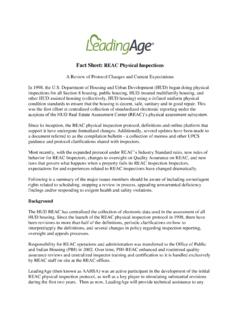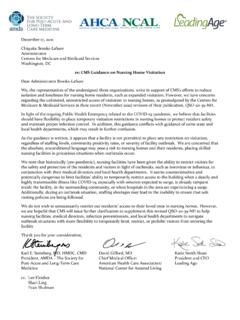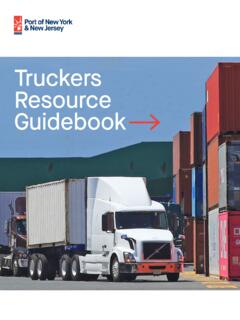Transcription of IMPLEMENTING TRAUMA- INFORMED CARE - LeadingAge
1 IMPLEMENTING TRAUMA- INFORMED CARE:A GUIDEBOOK2 About LeadingAge MarylandLeadingAge Maryland is a community of more than 120 not-for-profit organizations and a wide range of collaborators united to shape the future of aging in Maryland. Our mission is to expand the world of possibilities for aging through advocacy, education, innovation and collaboration. LeadingAge Maryland is a state affiliate of the national organization LeadingAge . Resilience for All Ages is an initiative of LeadingAge Maryland dedicated to equipping individuals and organizations to become more trauma- INFORMED and to advance trauma- INFORMED work with older adults.
2 Learn more at IMPLEMENTING Trauma- INFORMED Care: A GuidebookPublished 2019 by LeadingAge MarylandBaltimore, MDCopyrightKaren Heller Key ContributorKaren Key is President and CEO of Heller Key Management Consulting and serves as a Principal with Resilience for All Ages. Her career includes management roles in national nonprofit human services organizations, including six years at the national level with AARP, where she led the piloting of a model for engaging volunteers in improving the experiences of family caregivers and of older people receiving care at lifelong student of applied neuroscience, Karen has studied the cognitive dimensions of how trauma and traumatic stress impact the brain s executive function.
3 She has worked to apply this kind of cognitive science in human services settings, and is the co-author of an April 2015 article in the American Public Human Services Association journal Policy and Practice exploring the application of trauma- INFORMED approaches to self-care and resilience within the human services Schumann ContributorJill Schumann is the President and CEO of LeadingAge Maryland. Prior to her work with LeadingAge Maryland she served as the chief executive of Lutheran Services in America, one of the largest health and human services networks in the country.
4 She has created ground-breaking programs in post-acute healthcare and behavioral health, and has consulted with organizations on strategy, governance, innovation, and collaboration and is a frequent presenter at Kramer ContributorChristy Kramer is the Director of LeadingAge DC. A licensed nursing home administrator in Maryland for 15 years, Christy began her career as administrator of a 285 bed nursing home in Gaithersburg, Maryland. Over the course of ten years, Christy participated in large scale projects including: leading the selection and implementation of the electronic medical records system; the development of a culture change strategic plan; CARF-CCAC accreditation; Maryland Performance Excellence Award application; and Annual Licensure and Certification surveys.
5 Christy then moved to the George Washington University Master of Health Administration program where she worked with the long term faculty on curriculum development and NAB Accreditation. In addition, she counseled students on fellowship, residency, administrator-in-training and internship programs. During this time, Christy was appointed to the Board of Long Term Care Administrators for the District of Columbia. Christy recieved her Bachelor's degree from Cornell University and her Master of Health Services Administration from the George Washington Schiller ContributorLisa Schiller, LCSW, is Executive Director of MHY Family Services, a trauma- INFORMED organization.
6 She has served in management roles in local and national organizations. She is a long-time student of the practice of trauma- INFORMED care and believes that trauma- INFORMED organizations benefit both clients and staff through the development of safe, respectful and healthy 57101112131517181920212223252728282932 3335373842 INTRODUCTIONPRINCIPLES AND PRACTICES OF TRAUMA- INFORMED CARE: A QUICK REVIEWPREVALENCE AND IMPACT OF TRAUMADEFINING KEY TERMSCORE PRINCIPLESLEVELS OF IMPLEMENTATIONGETTING STARTEDFORMING A TRAUMA- INFORMED CARE IMPLEMENTATION TEAMCREATING A TRAUMA- INFORMED CARE IMPLEMENTATION PLANSPECIAL CONSIDERATIONS FOR NURSING HOMESMAJOR NEUROCOGNITIVE DISORDERS/DEMENTIAPHYSICIANS AND CONTRACTED HEALTH PROFESSIONALSRELATIONSHIP TO PERSON-CENTERED/DIRECTED CAREBEHAVIORAL HEALTH RESOURCESIMPLICATIONS FOR SHORT AND LONG STAY RESIDENTSSTAFF AND TRAUMAFAMILIES AND TRAUMAPOLICIES AND PROCEDURESRESOURCESSTATEMENT OF INTENTPRELIMINARY ORGANIZATIONAL ASSESSMENTTRAUMA- INFORMED CARE IMPLEMENTATION
7 TEAM FORMATION WORKSHEETIMPLEMENTATION PLAN CHECKLISTLEADING CHANGEGETTING THE BOARD 'ON BOARD'STAFF KNOWLEDGE: PRE- AND POST- TESTENDNOTESTABLE OF CONTENTS4 INTRODUCTIONI mplementing Trauma- INFORMED Care: A guidebook is the second in a series of tools and resources from Resilience for All Ages designed to assist nursing homes seeking to become trauma- INFORMED first, Foundations of Trauma- INFORMED Care, is a toolkit that includes: Foundation of Trauma- INFORMED Care: A Primer Six one-page lessons for staff Two slide presentations with notes to be used for presentations and training A User GuideIt will be helpful to become familiar with the Foundations before moving to implementation planning.
8 This guidebook focuses on trauma- INFORMED care implementation. It contains: A quick review of the basics of trauma and trauma- INFORMED care An explanation of the levels of implementation and the guidebook focus on Level One Steps to create an implementation plan and form an implementation team Special considerations for nursing homes A variety of resources for implementation Training and webinar resources are available from Resilience for All Ages and additional tools will be available in the months to this section will summarize basic information regarding trauma- INFORMED care.
9 It is important that those using this guidebook will first have read the Resilience For All Ages publication, Foundations of TRAUMA- Informated Care: An Introductory 2016 the Center for Medicare and Medicaid Services issued a set of changes to the requirements for nursing home communities that participate in Medicare and Medicaid Among the many changes finalized in this rule are policies designed to strengthen the provision of person-centered care to Person-centered care takes a holistic approach to meeting the needs of each individual resident, and considers psychosocial and spiritual aspects of well-being in addition to physical health.
10 While the term person-centered mirrors CMS language, many nursing home leaders aspire to what might better be described as person-directed services and supports, characterized by a recognition of residents rights to care that is shaped to meet their preferences and goals to the greatest extent order to provide this kind of care to all residents, nursing home communities must be equipped to understand and work with the circumstances, needs, and wishes of people who bring with them a wide variety of backgrounds and lived experiences. Accordingly, the new Requirements of Participation include an emphasis on providing services that are culturally competent reflecting cultural awareness and humility and that are sensitive and responsive to the special needs of residents who have experienced inclusion of a focus on trauma- INFORMED care reflects increasing recognition that the experience of trauma is widespread across the population and PRINCIPLES AND PRACTICES OF TRAUMA- INFORMED CAREA Quick Reviewhas significant long term consequences for health and well-being.








